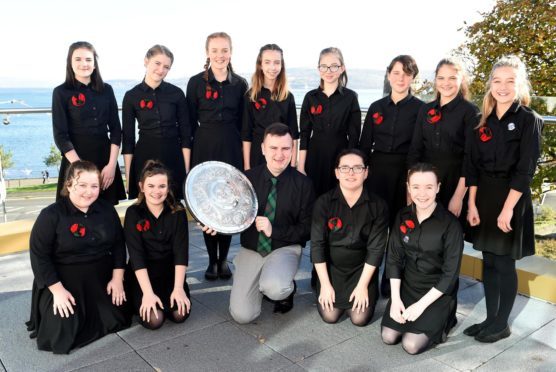A youth committee is working with An Comunn Gàidhealach to shape the Mods of the future.
The group was set up this year giving a nod to The National Year of the Young Person – and so far has set its sights on modernising the way in which the historic organisation communicates with the public to secure its future.
The committee of three – Shannon MacLean, 21, Padruig Morrison, 22 and Katie MacInnes 18 – is supported by 25-year-old Alison Bruce who is also employed by An Comunn Gàidhealach.
Miss MacLean, from Mull, said: “Being on the committee has been very interesting. Our main goal is to get more young people to come to the mod and get them involved in local mods around the country.
“This is my third mod in Dunoon, and it is certainly the competitions that have helped me, as a non-native speaker, take the language seriously.
“My job is to make sure it survives for a long time yet.”
Mr Morrison, from Skye, added: “It has been really good to be on the committee. We feel that our views are being taken on by An Comunn Gàidhealach.
Co-ordinator Miss Bruce added: “Young people were asked to apply to An Comunn for a place on the youth board. These three young people were chosen to become part of the youth board.
“We meet, and then the ideas are fed back into the An Comunn Gàidhealach board.
“We have been focusing on social media and getting ideas together, not only for this mod, but for future mods.
“I feel that we are being listened to and that the youth committee will have an impact for years to come.”
John Morrison, Chief Executive of An Comunn Gàidhealach, said: “With this year’s Mòd Celebrations focusing on the Year of Young People, it is great to see so many young Gaels investing in the language and engaging with the culture and community.”
Shake up
A radical plan to shake up Gaelic was launched at the Royal National Mod in Dunoon yesterday.
The group Misneachd, meaning bravery, is a 20-strong protest group who want to force banks and supermarkets to use Gaelic, outlawing the use of English as the default language in everyday life.
A statement read: “Gaelic is dying as a community language and those in power are ignoring this, but together we can change things.”
The group said it wanted “strong policies” including universal knowledge of Gaelic in the Western Isles and other core Gaelic-speaking areas, all children in Gaelic medium schools, six months free language immersion classes and the establishment of rights in law to be able to use Gaelic as the primary language of the land.
They added: “We are aiming to start a debate amongst Gaelic speakers and supporters over what can be done to strengthen the Gaelic language.”
Organiser Christopher – Gille-chrìost – Lewin, a 26-year-old student originally from the Isle of Man, said the organisers of the Gaelic plan are not doing enough to keep the language alive.
He said: “Gaelic should not be seen as a nice thing, or something that people should look fondly on. Gaelic is part of a wider struggle for social justice and human dignity.
“The Gaelic language in Scotland is extremely weak and ineffective compared with other countries.
“It needs to change – and it needs to change now.
“We cannot rely on the government and public bodies to do this. The [Scottish Government] Gaelic plan is meaningless because it does not push the language far enough.
“Gaelic is not something that is only cultural, it should be the way that we live our lives – it should be the economic driver for everything we do in Scotland.
“Victories for the Gaelic language plan will be won through a strong, organised grassroots movement – not through the government.”
Shona MacLennan, Bòrd na Gàidhlig chief executive, said: “Bòrd an Gàidhlig greatly welcomes people contributing to the important debate about how Gaelic can be strengthened and protected.
“The involvement of groups, such as Misneachd, in the future development of the Gaelic language creates opportunities to further the debate.
“Bòrd na Gàidhlig works in partnership with many different organisations and communities in Scotland and, as with all interested parties, the Bòrd is open to discussions and would be happy to meet with the group.”
